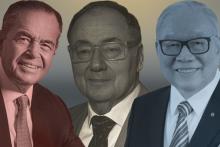Taittinger: A mission of happiness
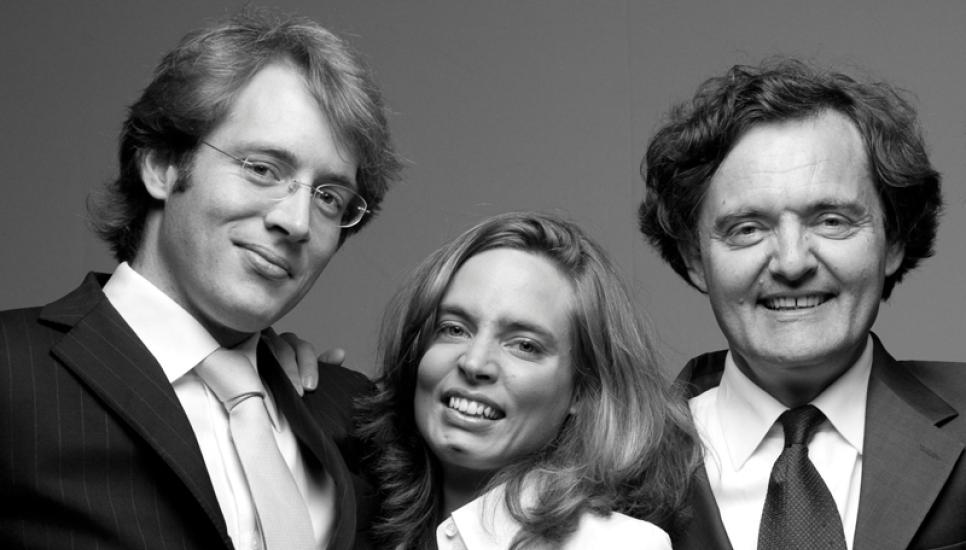
Religion is never far from the surface at Champagne Taittinger. The Gothic spires of Reims' Notre-Dame Cathedral are clearly visible only a mile from the office of Pierre-Emmanuel Taittinger, the president of the eponymously-named champagne house and figurehead for what he calls “the champagne mission”.
Taittinger's headquarters sit upon the remains of the Saint-Nicaise Abbey and have been based there since the 1940s, but the vaults that help its wines mature, carved into the chalky earth, have existed since Gallo-Roman times. Monks have used it to produce wines since the 13th century. Graffiti on the vault walls dates back to the 17th century where Taittinger's famous champagnes mature in saintly silence 18 metres underground.
 “I have a small mission of happiness, I am a little missionary,” says Taittinger, engagingly sitting forward on one of the large brown leather armchairs in his tastefully decorated office.
“I have a small mission of happiness, I am a little missionary,” says Taittinger, engagingly sitting forward on one of the large brown leather armchairs in his tastefully decorated office.
“What is my mission? To produce a few million bottles very well in a world of six billion people. I will never be the champagne for the six billion people. I do not have the quantity and the grapes to please them. But if I consider that a good customer of Taittinger is drinking five bottles per year, my mission is to find one million friends in a world of six billion people.”
Taittinger runs a thoroughly modern operation these days, although the recipe remains unchanged. Its 712 acres contribute half of the 5.6 million bottles released in 2013, 70% of them for the export market. This is expected to increase in 2014, although it's too early to give a precise number, the group says.
Taittinger is one of a few champagne houses still in family hands, but the third-generation business was almost lost. It passed out of their control in July 2005 when the seven branches and 45 members of the Taittinger family voted to sell the family business and its affiliate Société du Louvre for €2.1 billion ($2.5 billion) to US private equity group Starwood Capital. The hotel and real estate specialists bought the group for Société du Louvre's luxury hotels portfolio, including the Hotel Lutetia and Hotel de Crillon in Paris, but was openly looking to sell the champagne house from the outset.
Taittinger's connection with the Champagne region and its history made the family's decision to sell the family group to Starwood Capital a tough cross to bear for Pierre-Emmanuel. He had started working in the business in 1977, aged 24.
“I was not in favour of [the sale] but I had to accept it because it was voted for by a majority of the shareholders,” he says. As it turned out, Starwood didn't wait long to sell the champagne house.
“I became confident to buy back the company. I had been working in the company as a managing director already for a long time. And with a local bank [Crédit Agricole du Nord Est] as a creditor of champagne I organised to be one of the contenders,” he says. In June 2006, following an intense process with half a dozen interested buyers, Pierre-Emmanuel's consortium, which included a select group of private investors and friends, won the bid to buy back the then 73-year-old business for €560 million. It had been out of family hands for less than a year.
Taittinger's motivations for repurchasing his family's business reflected both his sense of history and sense of duty.
“I bought back Taittinger firstly for our customers all over the world. I wanted to continue to serve them, they have been faithful to us and I wanted to remain faithful to them. I bought back Taittinger for the employees of Taittinger, because they were sad to see this company abandoned by the family.
“And I did it finally and first for this man, my uncle,” says Pierre-Emmanuel pointing to a picture of a young man in uniform hanging on the walls of his office. Michel Taittinger served as a second lieutenant in the French Army and was posthumously decorated as a war hero. He died on 15 June 1940 holding off a German Panzer division for five hours with only 25 soldiers outside Saint Parres-aux-Tertres, in the Champagne region.
“For him I wanted to continue the story. His life is 10 times better than mine. For me he is an extraordinary example: a man of fate, engagement and conviction,” says Pierre-Emmanuel.
War also played a crucial role in the founding of Champagne Taittinger. In 1915, Pierre-Emmanuel's grandfather Pierre-Charles Taittinger, was a young cavalry officer stationed in the Château de la Marquetterie, near Reims. He fell in love with the 18th-century château and vowed that one day he would make it his family estate. In 1932 he returned with his brother-in-law Paul Eveque and bought the Forest-Fourneaux business, including the Demeure des Comtes de Champagne, in Reims and renamed it Taittinger.
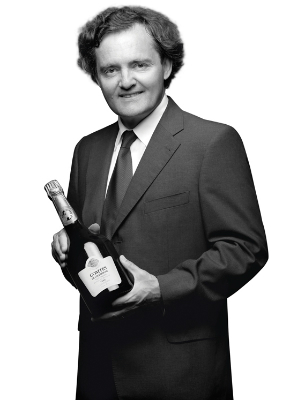 Pierre-Emmanuel (pictured right) is the third generation of his family to lead the business and his decision to buy it back is in keeping with his family's values, where humility and modesty are highly prized.
Pierre-Emmanuel (pictured right) is the third generation of his family to lead the business and his decision to buy it back is in keeping with his family's values, where humility and modesty are highly prized.
So what does the company stand for according to Pierre-Emmanuel? “To sell good champagne before we sell ourselves, to cultivate modesty, and to always show the quality of our wines, to do everything to make it delicious.”
This need for modesty and patience also comes down to the product that's been produced: a recipe for champagne that's remained unchanged for centuries.
“When you produce a bottle of champagne you don't change your process every minute. It's the same process as many decades ago. It has something to do with the time, with the nature, with the silence [in the cellars].”
It's for this reason that Pierre-Emmanuel bristles when he's asked about the group's plans for growth, even after he's confirmed that annual revenues were €130 million in 2013.
“I cannot say to you my wish is to progress by 20% per year. We have 300 hectares, we have limited position,” he says, adding that a hectare in the Champagne region costs €1.04 million.
“I don't know this year if the harvest is going to be good. If I have a very bad harvest this year I will have to reduce my sales in three years intensely. If I have a very good harvest I will be able to increase a little bit my sales,” he says.
As if to prove the point, our interview is interrupted only once. The group's vineyard manager, Vincent Collard, comes in to give Pierre-Emmanuel an up-to-date weather report. [There was a small frost overnight, but nothing to cause concern].
“I cannot think the same way as a man who produces shoes, cars, perfume, or scotch whiskey. They don't think my way. They have to think about profit, market shares, increased growth. If I can sell a little bit more, if I can profit a little bit more, keeping the top quality, I will be happy.
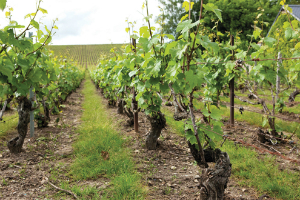 “I am like a farmer. A farmer cannot say I will double my production if he cannot double his land. He needs a good harvest and he needs to buy 10 times more land to do that,” he says.
“I am like a farmer. A farmer cannot say I will double my production if he cannot double his land. He needs a good harvest and he needs to buy 10 times more land to do that,” he says.
This long-term approach, a classic signature of family businesses, is why Pierre-Emmanuel refuses to overly inflate the price of his champagnes.
“Taittinger is successful because we are reasonable. We produce excellent, affordable champagne. When I think a bottle of wine is more than €3,000 nobody can buy it. It's not my philosophy about champagne.
“Obviously we have to make profit. But I think we have to be reasonable. I don't like excess. When a bottle of wine costs more than the salary of a nurse in a hospital for your kids or mine, I think it's stupid.”
“Obviously I am concerned about making profit, about earning money, if not I would not be in charge. But for me it's a balance. Taittinger is not only a champagne for billionaires. Taittinger is a champagne for connoisseurs and connoisseurs are not always billionaires.
“I don't think we need to be the most expensive to show we are the best. Sometimes the best products are not the most expensive. The best car is not always the most expensive, the best shoes are not always the most expensive,” he says passionately.
Insead professor and family business consultant Christine Blondel says the importance of values to Taittinger is why it's a great example of a family business.
“The family brings the soul of the business. This soul rests on values,” says Blondel. “The commitment and stewardship is there, not just for your personal gain, but because you are committed to the business,” she adds.
Blondel says Taittinger is a successful case of a “serial business family”, a termed coined by Denise Kenyon-Rouvinez, a family business expert from the IMD business school in Switzerland. The concept refers to family firms who achieve a positive outcome from a sale by reinventing themselves and starting a new business together or re-purchasing part of the business. Elements that made the business successful are kept and those that hindered it are dropped.
“Taittinger Group [before the sale] had several different activities. But they had a part of it, the champagne business, which they had for three generations … They managed it and their name was on the bottle. A few members of the family were really committed to bring it back into the family. In that sense it is a very interesting story. Serial business families learn from the past and learn from the difficulties,” she adds.
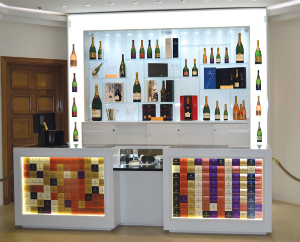 Simon Field, a master of wine, buys champagne for Berry Brothers & Rudd – the 316-year-old UK wine merchant owned by the Berry and Rudd families. (The UK is the world's largest export market for champagne).
Simon Field, a master of wine, buys champagne for Berry Brothers & Rudd – the 316-year-old UK wine merchant owned by the Berry and Rudd families. (The UK is the world's largest export market for champagne).
Taittinger is one of the so-called Grandes Marques – an esteemed group of the most prominent houses from Champagne. The “jewel in its crown”, says Field, is the 2005 Comtes de Champagne vintage, which is “on a high at the moment and was very well received by the fine wine market”.
Field notes there were concerns raised several years ago when Taittinger's non-vintage was being sold in great volume in UK supermarkets by 'deep discounting' the product.
“I was slightly worried about that [deep discounting], but in the past few years they seem to have raised their game. The marketing, because of the clever use of the younger family members, seems to be more focused and the quality of the raw material, including the large volume brut non-vintage wine, seems to have improved. The overall perception is that they are back on form. The Comtes de Champagne is on a high and seen as one of the best of the prestige champagnes,” he adds.
Still, challenges persist for champagne makers. Field says that the champagne industry faces the permanent challenge of balancing supply and demand, as well as predicting the meteorological and economic cycles. This is not to mention the potential threats posed by climate change. The growing seasons could be shortened by increasing temperatures, which could threaten the fragile equilibrium required for champagne to achieve the optimal balance between acidity and sugar.
Being family-owned is not a unique element among champagne houses. Other significant family-owned producers include Laurent Perrier, Pol Roger and Louis Roederer.
The strong family ethic was a big factor in convincing Pierre-Emmanuel's small group of external investors, friends of the family, to buy into Champagne Taittinger, or what he calls “the champagne project”
“[The external investors] have come into it because it is a family company, because they want us to continue. They said 'If you quit, we quit with you'. My family have organised to be in charge and to continue in the family spirit,” says Pierre-Emmanuel.
Buying back the champagne business has been a great success, but what then of the upcoming hurdle that unseats many family businesses – succession. How much longer will Pierre-Emmanuel, 61, lead the business, and will his daughter, Vitalie, or son, Clovis, take over from him?
Typical of his humility, Pierre-Emmanuel has no desire to be a kingmaker with sole responsibility for anointing a successor. The process will be left to the 15-strong management team.
“I have organised a nice atmosphere in the management team. In five years they will probably choose the best person together in a nice way to manage the company… I hope that in this beautiful family atmosphere among 10 great friends together they would choose the best one. Really for us at Taittinger, the problem is not who is going to manage,” he says.
Does he not want to see the next generation leading the family business? Vitalie, 35, joined Champagne Taittinger when her father bought back the company, and is now its art director – featuring prominently in its advertising campaigns – and acting as a brand ambassadress. Pierre-Emmanuel's son, 36-year-old Clovis, joined the business in 2007. He has managed the brand's export department since 2011, which serves 140 markets.
“[Vitalie and Clovis] are doing very well. They are carrying an enthusiasm for the business. But they never think in terms of 'I will be or I will not be the boss'. Not in a company like us.
“The person who will run the company will be a good man or good woman and do it well, and with all the people with him, and all the family. But when I speak to my son or my daughter I can promise you, this question is not even raised. What is important is to continue to produce a good champagne,” he adds.
Is Blondel convinced by Taittinger's succession plans?
Yes, she is. “The wisest thing he can do is to say to the board: 'find my successor'. Because they restarted with a smaller group of family members than they had before they sold, they most likely do not have communication issues,” she adds.
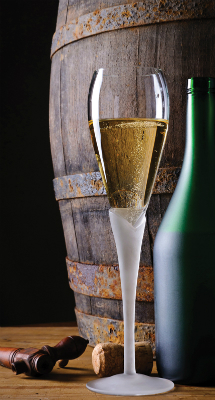 Pierre-Emmanuel is unlikely to change his mind about holding onto the reins too long (he plans to step down in about five years' time). He thinks patriarchs and matriarchs should step away from family businesses at the very latest when they reach 70 years old – a step many have failed to take.
Pierre-Emmanuel is unlikely to change his mind about holding onto the reins too long (he plans to step down in about five years' time). He thinks patriarchs and matriarchs should step away from family businesses at the very latest when they reach 70 years old – a step many have failed to take.
“In the family business, one of the most important things to think about is not to stay too long in charge. I have seen a lot of family firms going down because the founder was a genius when he or she was 40 and 50 and became a disaster when he or she was 75, 80, 85 … I have seen so many glorious stories finishing badly,” he says.
In his view this retirement should be from everything: day-to-day management to the board.
“I believe that one should quit at 70. But really quit, even the board, to say I am just a shareholder. Because otherwise you still control the board,” he adds.
It all comes back to his modest mission.
“If you ask me what is the best thing to do in your life, it would be to pray in a church or to walk in the French Alps all day,” says Pierre-Emmanuel.
He acknowledges that what he is doing pales in comparison to a doctor, or a nurse, but there remains a purpose to his mission.
“I have to make money. I have to make good champagne. That is a rule. I have to do it. But after that, I think what is the final mission of champagne?
It is the pleasure of seeing happiness when somebody modest has a bottle of champagne, once a year. I am pleased by that.”
A pleasant mission to pursue. I'm converted.


